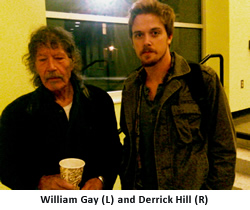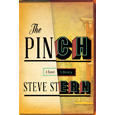A Modern-Day Sage
Something in those dark, focused eyes made you think he possessed answers to questions that weren’t meant to have answers
I had the opportunity just over a year ago to interview William Gay for the Tennessee Literary Project. Near the end of the conversation, William said, “Writing should feel like it’s about something bigger than it is.” I have mulled over these words time and again. With William, it wasn’t only the work but the writer himself who seemed to be about something “bigger.”
 I’m not exactly sure what that bigger thing was or that I’m meant to know for certain; I just know my visits with William will always retain a mystical quality. This isn’t because he was some flashy, eccentric character who was so far out there that he was untouchable—anyone who has spent any considerable amount of time with William knows he was quite the opposite—or that he had grandiose ideas he was determined to get across. He was the most humble, down-to-earth person you will ever meet, dirty jeans and all.
I’m not exactly sure what that bigger thing was or that I’m meant to know for certain; I just know my visits with William will always retain a mystical quality. This isn’t because he was some flashy, eccentric character who was so far out there that he was untouchable—anyone who has spent any considerable amount of time with William knows he was quite the opposite—or that he had grandiose ideas he was determined to get across. He was the most humble, down-to-earth person you will ever meet, dirty jeans and all.
Yet when you were around him there was something enigmatic that drew you in when he spoke, whether he was reading his work or talking about two of his favorites, Bob Dylan and Cormac McCarthy. Something in those dark, focused eyes made you think he possessed answers to questions that weren’t meant to have answers. An underlying awareness of unspeakable truths you hoped you would absorb through osmosis.
This is why I drove to Hohenwald every chance I got. Because out there, twenty minutes beyond any cell-phone signal, tucked away in a log cabin at the bottom of the residing hills, lived a modern-day sage. In the same interview for TLP, William said, “One of the things that is so interesting about writing to me, at least, is that it is so hard to explain. It’s like ephemeral, you can’t really get a grip on it, why you do it, or where it comes from.” I’m not sure where it came from either, but I’m glad he found it and decided to share it with all of us.
Derrick Hill is an artist and a student at Middle Tennessee State University. He lives in Bell Buckle, Tennessee.


